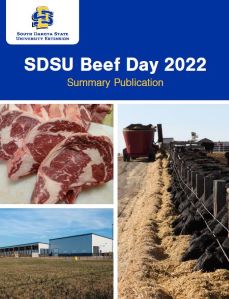
SDSU Beef Day 2022 Summary Publication
Document Type
Article
Publication Date
1-25-2022
Abstract
Study Description:
First developed as a concept for approaching grazing resources management by Alan Savory in the 1970’s as a means of combating poor grazing practices, the concept of Holistic Management has evolved in the modern era to Holistic Resource Management, or in some cases “Wholistic” Resource Management, suggesting a more inclusive approach to overall planning and assessment beyond developing a sustainable grazing plan.
In simplified terms, a complete Holistic Resource Management plan for an agricultural businesses ultimately embraces a core concept that centers on the original ‘Triple Bottom Line’ accounting philosophy where the three “P’s” of profit, people, and planet are all viewed as valuable measures and the advancement of a balanced relationship between these measures leads to successful management of a business as a whole.
There are several iterations of the three “P’s” in various business sectors, but all generally reflect the broad categories of measuring sustainability in relation to Social, Environmental, and Economic impact. In the farming and ranching industry, these measures are often re-labeled as finances, resources (land and other assets), and people (often family).
There is, and will continue to be, a great deal of debate over Savory’s grazing model. And key to the success of triple bottom line accounting, as explained by the founder of the concept John Elkington, is that it be more than simply a method of accounting. Rather, both are designed to provoke deeper thinking about the entirety of the thing being assessed.
Because of this more open interpretation, the combination of Holistic Resource Management coupled with Triple Bottom Line accounting creates a framework for agricultural producers to walk through a process of recognizing and challenging paradigms, creating vision, setting goals, identifying and engaging key persons, and learning to work with (instead of counter to) natural processes that can lead to greater profitability and resilience.
Pages
2
Publisher
South Dakota State University
Rights
© 2022 South Dakota Board of Regents
Recommended Citation
Bauman, Pete, "Principles of Holistic Resource Management: Investing in Self-Education" (2022). SDSU Beef Day 2022 Summary Publication. 14.
https://openprairie.sdstate.edu/sd_beefday_2022/14
